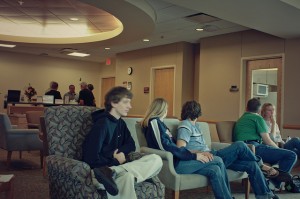The healthcare system is constantly ev olving as are the measures and technology to keep it secure. Technology can and should play an integral role in the protection and management of any healthcare facility. Healthcare facilities can be anything from a hospital to an assisted living environment, or a portable x-ray unit to a rehab center. While most of these environments are typically considered safe, the need for security is vital nonetheless. There are a multitude of external and internal factors that determine a facilities’ security needs. Safety in a healthcare environment is not only important to the staff and facility manager, but the public as well. Are your patients, staff, and assets being adequately protected?
olving as are the measures and technology to keep it secure. Technology can and should play an integral role in the protection and management of any healthcare facility. Healthcare facilities can be anything from a hospital to an assisted living environment, or a portable x-ray unit to a rehab center. While most of these environments are typically considered safe, the need for security is vital nonetheless. There are a multitude of external and internal factors that determine a facilities’ security needs. Safety in a healthcare environment is not only important to the staff and facility manager, but the public as well. Are your patients, staff, and assets being adequately protected?
What Requires Protection?
When thinking about healthcare facilities, visualizing medically related images like that of a stethoscope or a doctor is typical. Picturing surveillance equipment and access cards is probably not the first thing that comes to mind. However, security is a major issue for many facilities. They are dynamic spaces that have an obligation to protect staff, patients, and assets, while also making the public feel comfortable. Who and what needs protection, and why?
People visit healthcare facilities seeking treatment and care for a multitude of issues. These people are you, me, our families, our friends, and the people we don’t know personally. Families want to know that their loved ones are being taken care of properly when they can’t be around. A knowledgeable security systems company, like Perfect Connections, Inc., knows that whether patients are in a hospital, clinic, or an assisted living facility, installing a comprehensive security system will not only help protect them, but can help provide peace of mind. It could also help decrease the chances of patient elopement. According to The National Institute for Elopement Prevention elopement is defined as, “When a patient or resident who is cognitively, physically, mentally, emotionally, and/or chemically impaired; wanders away, walks away, runs away, escapes, or otherwise leaves a caregiving facility or environment unsupervised, unnoticed, and/or prior to their scheduled discharge.” This should be a concern because in all likelihood the healthcare organization would be liable; it could be financially catastrophic for a facility and emotionally disastrous for a family. Patient elopement could become a public safety concern if a violent criminal were to escape, if another patient were abducted during an escape, or if an individual with an infectious disease were to flee. Remember, all types of individuals are admitted for treatment.
The safety of a healthcare facility’s staff and pharmaceuticals is paramount to their success in treating patients. According to Joel Griffin, editor at SecurityInfoWatch.com, across the United States, there has been an increase in healthcare facility crimes. Crimes include theft, assault, vandalism, rape, and homicide. Griffin states, “98 percent of healthcare facilities now experience violence and criminal incidents.” This seems shocking but the reasons behind why are not, it’s just they may not be obvious. For instance, in today’s fast paced, non-stop society, many healthcare organizations are operating before and/or after the average 9am-5pm work day, if not 24/7. This leads to increased foot traffic resulting in a higher probability of potential crime.
 Drug addicts and other substance abusers can be problematic if on site pharmaceuticals are not effectively fortified. Substance abuse can be an internal staff issue as well. In fact, the Centers for Disease Control and Prevention (CDC) cites significant consequences of healthcare providers pilfering patients’ narcotics, including patients not receiving proper treatment or being deprived of adequate pain relief, and the risk of infection from life-threatening diseases like Hepatitis C. With advanced access controlled security systems in combination with monitored surveillance, these risks can become substantially limited. It’s not always enough to have a locked cabinet or storage area, keys are too easily stolen and/or replicated.
Drug addicts and other substance abusers can be problematic if on site pharmaceuticals are not effectively fortified. Substance abuse can be an internal staff issue as well. In fact, the Centers for Disease Control and Prevention (CDC) cites significant consequences of healthcare providers pilfering patients’ narcotics, including patients not receiving proper treatment or being deprived of adequate pain relief, and the risk of infection from life-threatening diseases like Hepatitis C. With advanced access controlled security systems in combination with monitored surveillance, these risks can become substantially limited. It’s not always enough to have a locked cabinet or storage area, keys are too easily stolen and/or replicated.
With any type of healthcare it’s crucial to protect private patient information. This means any patient files, which in toda y’s techy world are probably being converted to digital data. A patient’s file contains personal and private information to be shared between caregiver and patient only. There is a heavy responsibility placed on healthcare organizations to uphold this confidentiality. Maintaining general HIPAA (Health Insurance Portability and Accountability Act of 1996) security and privacy policy procedures may not be enough. With the use of mobile devices, laptops, and other technology health administrators need to be conscious of where and how accessible information is. Many doctors and other medical staff use mobile tablets to record patient information; having an access password or encryption can help, but what happens when the device is accidentally left behind or in an unprotected area? The physical items that contain patient information should be kept in a monitored, access controlled portion of the facility. The consequences of a HIPAA violation can be costly, even if accidental. In fact, in the case of a “did not know” violation, the penalty can be upwards of $50,000/violation to $1.5million/year for the same violation. It is in any healthcare organizations’ best interest to secure this private information. The cost of a comprehensive security system is nothing compared to what the cost for lost data and damages could be.
y’s techy world are probably being converted to digital data. A patient’s file contains personal and private information to be shared between caregiver and patient only. There is a heavy responsibility placed on healthcare organizations to uphold this confidentiality. Maintaining general HIPAA (Health Insurance Portability and Accountability Act of 1996) security and privacy policy procedures may not be enough. With the use of mobile devices, laptops, and other technology health administrators need to be conscious of where and how accessible information is. Many doctors and other medical staff use mobile tablets to record patient information; having an access password or encryption can help, but what happens when the device is accidentally left behind or in an unprotected area? The physical items that contain patient information should be kept in a monitored, access controlled portion of the facility. The consequences of a HIPAA violation can be costly, even if accidental. In fact, in the case of a “did not know” violation, the penalty can be upwards of $50,000/violation to $1.5million/year for the same violation. It is in any healthcare organizations’ best interest to secure this private information. The cost of a comprehensive security system is nothing compared to what the cost for lost data and damages could be.
Preventative Measures
Having a security system installed after a disastrous event can help prevent future problems, but this is a reactive approach versus proactive. Healthcare providers have more important matters to deal with, never mind who or what is trying to wreak havoc on or in their facility. With a comprehensive security system these worries can be significantly lessened, or avoided all together. If planning a new facility it’s beneficial to involve a security systems company like Perfect Connections, Inc. from the start. Our professionals can help create a more complete security solution, and avoid costly alterations after the fact.
There are numerous considerations that must be taken into account when creating a security system for a healthcare facility. Therefore, an inclusive security assessment should be performed by a licensed professional whether it’s for an existing or new structure. A security assessment will help provide a specific solution to an individual facility’s needs. The assessor should not only review any history of security breaches in the past, but talk with the staff to gain a better understanding of the day-to-day activity. Once the assessment is complete they can customize a suitable system.
 A custom security system is the best option because no two facilities are exactly the same; even if two buildings share the same schematics, the locations will be different, and the demographics of an area will be factored into the type of security needed. Some commonalities between systems may include features such as access controls for visitors, patients, and staff, video surveillance and alarm monitoring. According to Steve Nibbelink, CHPA, in regards to physical security features, “when they are part of an integrated, technology master plan, the healthcare organization can improve security and operational efficiencies, while also reducing the associated cost. In fact, in Hospital and Healthcare Security, the authors state, ‘Authorities estimate between 3 and 10 percent of hospital expenditures could be saved if proper security controls were implemented.’” Security systems can prevent disasters from happening so healthcare professionals can take care of what matters most, their patients.
A custom security system is the best option because no two facilities are exactly the same; even if two buildings share the same schematics, the locations will be different, and the demographics of an area will be factored into the type of security needed. Some commonalities between systems may include features such as access controls for visitors, patients, and staff, video surveillance and alarm monitoring. According to Steve Nibbelink, CHPA, in regards to physical security features, “when they are part of an integrated, technology master plan, the healthcare organization can improve security and operational efficiencies, while also reducing the associated cost. In fact, in Hospital and Healthcare Security, the authors state, ‘Authorities estimate between 3 and 10 percent of hospital expenditures could be saved if proper security controls were implemented.’” Security systems can prevent disasters from happening so healthcare professionals can take care of what matters most, their patients.
Visit Perfect Connections, Inc. to discover how decades of providing security systems solutions for healthcare facilities can benefit your organization. We will customize a solution that best fits your facility’s needs. We know that no two patients are exactly the same, and no two organizations operate exactly the same.
If you live in Central or Northern New Jersey and would like information on any of the topics discussed above, please call 800-369-3962 or simply CLICK HERE.
Image Credits: Image #1 by Tristan Bowersox-Flickr-Creative Commons, Image #2 by Images Money-Flickr-Creative Commons, Image #3 by Alex Gorzen-Flickr-Creative Commons, Image #4 by COD Newsroom-Flickr-Creative Commons
